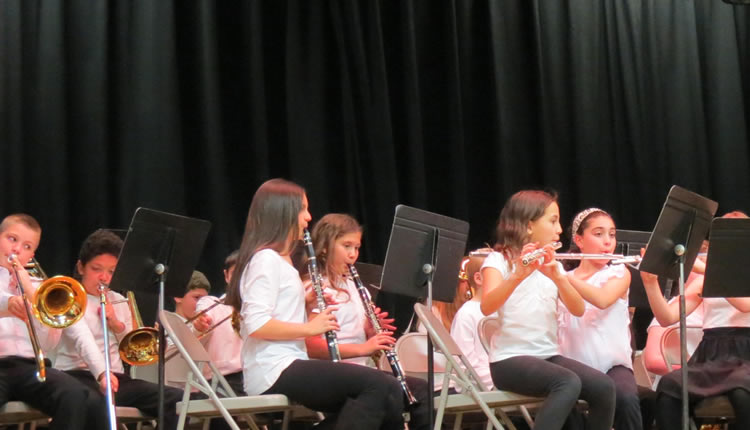Beginners Need High Quality Instruments
John Whyte
A native of Kenosha, Wisconsin, John Whyte has been a band director at the elementary and secondary levels of the Kenosha Unified School District since 1980 and is active as a private trumpet teacher, clinician and soloist. He received his BFA from the University of Wisconsin (Milwaukee) and his master’s degree from Carthage College (Kenosha). Mr. Whyte has been a U.S. Army Bandsman, principal trumpet of the UW-Oshkosh Wind Ensemble, founder of the UW-Milwaukee Summer Winds and a student of Milwaukee Symphony principal trumpeter Richard Metzger. This summer, John was the first person to complete an intensive “externship” at Leblanc through the cooperative efforts of the Kenosha schools and Gateway Technical College.
Why are you reading this column? Perhaps you’re a teacher, a performing -musician or someone involved in the manufacture, sale or repair of musical instruments. Whatever your line of work, it’s safe to assume two things about you: (1) you value music, and (2) given a choice, you prefer music of high quality.
We needn’t go far out on a limb in making these assumptions. After all, virtually everyone values music, even those who don’t consciously think about it. Music is pervasive in our society, everywhere at all times. And even if we travel far from civilization, Mother Nature still creates a symphony of sounds for us with birds, water, wind and so many other elements. Music is a natural expression of our humanity and a reflection of our world. It is as much a part of us as breathing, as the beating of our hearts. Music is life.
The second assumption, that you prefer high-quality music, is clearly another no-brainer. Given the choice, everyone prefers to experience “the best” in their lives, to be a winner. Perhaps that means being valedictorian of your class, a member of a championship athletic team or top salesperson for your company.
Quality is the main ingredient of success. And success is the main ingredient of happiness. Because definitions of success vary from person to person, happiness is a highly individual state of mind. We can still venture to say, though, that anyone’s definition would include high-quality experiences as the benchmarks by which success is measured.
We all have the ability to set priorities based upon our value systems. Accordingly, we allocate our resources, including time, energy and money. If, for example, you wanted to become the best possible golfer, you might take lessons, subscribe to magazines, watch videos and purchase a well-made set of clubs. The clubs alone could cost thousands of -dollars, but you would justify the expense because high-quality equipment -increases your chances of success and, consequently, happiness.
By now you may be asking yourself, What does all this have to do with music education? The answer, in a word, is plenty!
Poor-quality equipment makes development of a new skill more difficult. It doesn’t matter whether the new challenge is learning to play golf or clarinet – the lower the quality of equipment being used, the more difficult and frustrating the development of skills will be. Conversely, high-quality equipment will help any level of learner to improve, and it is especially important to the progress of a beginner.
The beginner’s task is the most difficult. Everything is new, with every step a challenge. There are so many physical and mental tasks to master that the last thing a beginner needs is problems with his or her equipment, which can turn an already difficult process into a series of insurmountable tasks. This is especially true in the case of elementary-age students learning to play band instruments.
The typical beginning band student juggles a busy schedule that begins with five full days of school each week. The student then fills his or her “free” time with jobs, scouts, church groups, cheer-leading, athletics, baby-sitting, choir, safety patrol, fund-raising, orthodontist appointments, paper routes and clubs ad infinitum. Musical activities such as practicing, lessons, rehearsals and performances must compete with all of the above for students’ time, energy and interest. And it is virtually impossible to maintain students’ interest in their music if their instruments are of low quality and are difficult to play.
Each year, many students begin in-strumental study with excitement and anticipation, only to be discouraged by the frustration of playing poorly made or antiquated instruments that are incapable of producing a characteristic sound, even when the student is doing everything correctly. The list of potential problems inherent in low-grade band-instruments is virtually endless and certainly too long to detail in this column.
There are obvious steps that can be taken in advance, though, to ensure that beginning band students avoid the frustration and eventual failure that can result from attempts to learn on unplayable instruments. Parents of pro-spective music students should do any of the following: (1) Ask the school band instructor for recommendations of good student-line instruments. (2) Ask for recommendations at a local full-service music store, especially if it has a reputable service department. (3) Ask the opinions of any respected private teacher of the instrument they are considering for their child.
Although some parents have enough experience with musical instruments to understand the need for high quality, most do not have that background and can easily make a mistake. Parents usually must be educated to the fact that the choice of instrument for their child can have a major influence on the child’s success or failure during the first weeks and months of instruction. This is especially true when obtaining an instrument through a source other than a full-service music store.
Risky instruments include those from a relative or friend, want ads, department store catalogues and – worst of all – the attic. If parents feel they must obtain an instrument through one of these sources in order to stay within budget constraints, fine, but they should then take the instrument on approval to a music store or band instructor to receive an objective appraisal of the instrument’s quality and value. At the same time, they could get an estimate of what it would cost to put the instrument back into good playing condition, if necessary.
The most obvious means of ensuring that a beginning music student has a high-quality playable instrument is to buy a new instrument from a reputable full-service music store. A frequent alternative, appealing to many parents, is to rent the instrument from the store, usually with the option to re-rent or to purchase it at the end of the semester or the school year.
To invoke an old maxim, You can’t make a silk purse out of a sow’s ear. In other words, a poorly made instrument will always play poorly, no matter what steps are taken to improve upon it. The bottom line is that a low-quality instrument will do the student more harm than good, decreasing the student’s likelihood of success.
At every opportunity, parents should be encouraged to obtain the best student instruments they can afford. Their children will thank them – musically – every time they perform.



